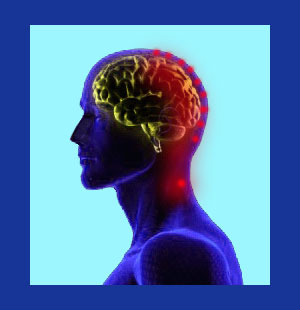
A combination of neck and scalp pain is one possible consequence of tension headache. A large percentage of patients report that their tension-style headaches actually start in the upper neck, near the base of the skull and progress to affect some or all of the head. Although tension headache feels internal, within the substance of the brain, the mechanism that causes the pain is actually simple ischemia of muscular tissues in the scalp, head, neck and face. Oxygen deprivation of these tissues causes the acute pain we have come to expect when suffering a tension headache flare-up.
This guide concentrates on explaining the incidence of combination neck pain symptoms in the upper cervical spinal region, the scalp and elsewhere in the head as a result of tension headache.
Interrelated Neck and Scalp Pain
The usual manner in which neck pain is related to discomfort experienced in the head is through a particular type of syndrome called a tension-style headache. This is the most widely experienced form of headache, also called a “common headache”.Unfortunately, many victims mistakenly call tension headaches migraines. Migraine headaches are caused by the same mechanism of ischemia. However, migraines involve oxygen deprivation of a particular blood vessel in the brain itself, while tension headaches affect the muscular structures in and around the head. Furthermore, migraines are most often precipitated by the visual phenomenon known as an aura, where tension headaches typically lack this scintillating light pattern in the peripheral vision of the victim, prior to onset of actual pain.
Tension headaches usually act regionally, depriving all the muscular structures in a particular region of the neck and head of necessary oxygen. This causes a regional pain pattern that typically grows as the headache develops, often encompassing a full half or more of the head. Patients most often report the start of symptoms unilaterally at the base of the skull. Less commonly, pain might begin behind one eye or just behind one ear. Typically, symptoms will spread across the head, back to front and encompass a full side or more of the total head. These torturous headaches can last an hour or a few days, with the average span of symptoms enduring overnight in many instances.
Unrelated Scalp Pain
Some patients might demonstrate unrelated pain in parts of the neck and head.These are singular pain syndromes that happen to occur simultaneously, but not due to the same causation. Some possible explanations for these unrelated symptomologies can include any of the following scenarios, as well as many other potential combinations:
The neck discomfort might be caused by any of the usual causes of neck paindetailed throughout this web resource. These can include spinal, muscular, mindbody or systemic concerns that might cause acute or chronic symptoms.
Unrelated pain in the scalp might be due to headache that is not responsible for causing the neck expressions. Alternately, pain might be due to localized nerve dysfunction, skin problem or rare muscular disease affecting the soft tissues of the head and scalp.
Neck and Scalp Pain Advisory
The vast majority of neck and scalp pain syndromes are the results of normal headache conditions. These pains might be very severe and oppressive, but are not considered serious by most medical clinicians. Experiencing occasional headaches, even of a severe variety, is a universal human occurrence, often linked to psychoemotional stress, although this stress is often not conscious and may be completely suppressed or repressed within the confines of the subconscious mind.
Recurrent extreme headaches can be a disabling problem and may require dedicated treatment by a specialist. Unfortunately, there are few treatments that work well for all affected patients, since the causative mechanisms for such headaches are often complicated, subtle and not structurally-motivated.
To learn more about the relationship between symptoms in the scalp andsymptoms in the neck region, talk to your physician. They will be able to evaluate the condition and advise you on treatment or at least be able to refer you to a specialist who can get you on the right path to improved health and better physical and cognitive functionality, despite severe tension headache.
Neck Pain > Combination Neck Pain> Neck and Scalp Pain





